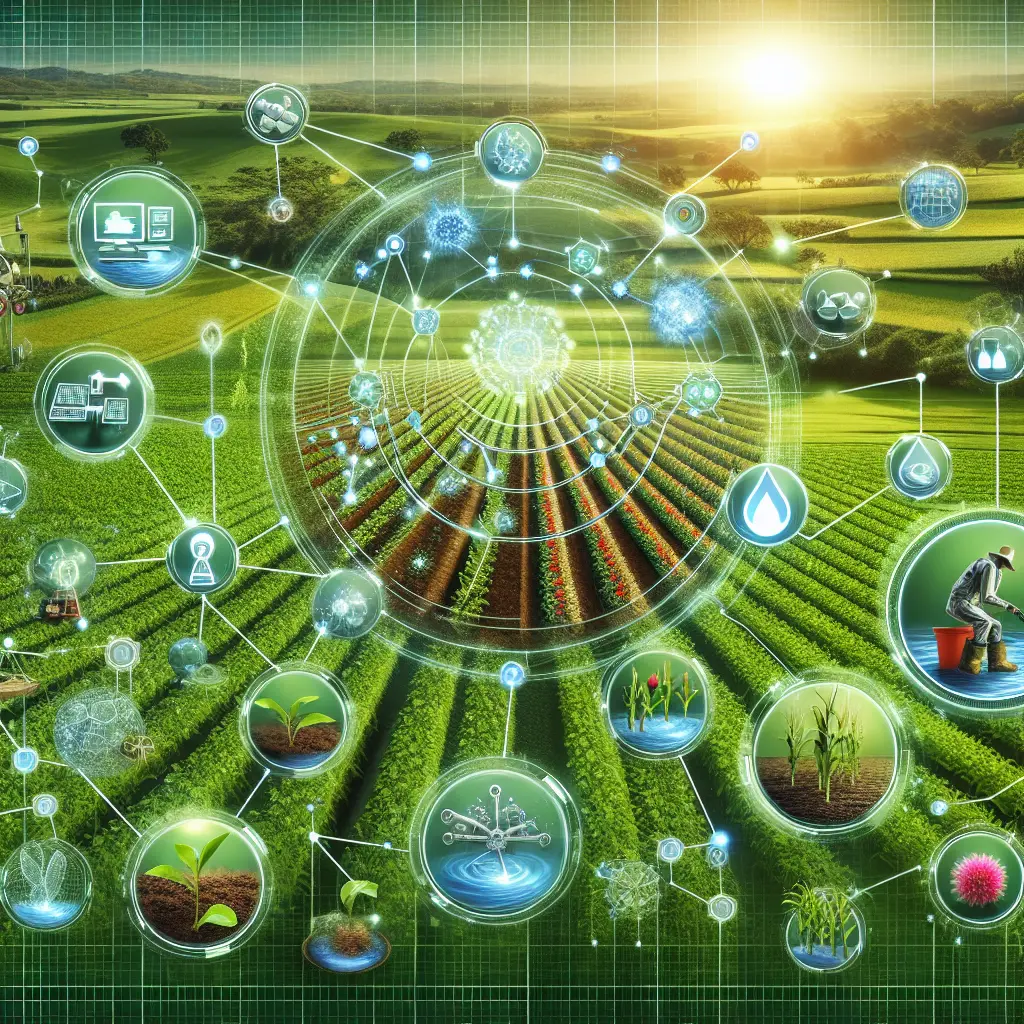
Transforming Agriculture with Nanotechnology
In an era marked by pressing environmental challenges and a growing demand for food security, nanotechnology in agriculture emerges as a transformative force driving sustainable agriculture. This agricultural innovation is redefining how we approach farming by integrating precision agriculture techniques with cutting-edge nanotechnology applications. At the heart of this revolution are nano-fertilizers and nano-pesticides, which promise to enhance crop yield improvement while safeguarding soil health and promoting water conservation.
Nanotechnology's benefits extend far beyond simple yield increases. By enabling smart farming practices, these eco-friendly solutions offer a promising path toward environmental sustainability. For instance, the use of nanomaterials in agriculture enhances resource utilization efficiency, reducing waste and minimizing the ecological footprint of farming activities. As these technologies advance, they hold the potential to revolutionize sustainable farming practices, ensuring agriculture meets today's needs while preserving resources for future generations.
In the quest for sustainable agriculture, nanotechnology is paving a transformative path. It integrates precision agriculture with cutting-edge applications, including nano-fertilizers and nano-pesticides, promising substantial improvements in crop yield, soil health, and water conservation. But how exactly is nanotechnology revolutionizing the agricultural landscape, and what are its implications for the future of farming?
The Role of Nano-Fertilizers and Nano-Pesticides
One of the most exciting developments in agricultural nanotechnology is the use of nano-fertilizers and nano-pesticides. These innovations are not just about increasing crop yields but also improving the efficiency of resource use. Unlike traditional fertilizers, nano-fertilizers release nutrients more effectively and reduce leaching into the soil, thus safeguarding soil health and promoting water conservation. According to a study published in the Journal of Agricultural and Food Chemistry, nano-fertilizers can enhance nutrient uptake by plants, leading to better growth rates and higher yields (American Chemical Society).
Similarly, nano-pesticides offer precision targeting of pests, minimizing chemical usage and reducing ecological footprints. This precision reduces the risk of harm to non-target species, contributing to more eco-friendly farming solutions. Such advancements are crucial in addressing food security challenges while maintaining environmental sustainability.
Smart Farming and Precision Agriculture
The integration of smart farming practices with nanotechnology is reshaping modern agriculture. Through innovations like smart sensors and responsive nanodevices, farmers can achieve unprecedented levels of precision in managing their operations. These technologies allow for optimized inputs, which not only boost crop yield improvement but also reduce chemical usage, fostering a healthier ecosystem.
For instance, nanosensors can monitor soil conditions in real-time, enabling farmers to make informed decisions about irrigation and fertilization. This not only conserves water but also ensures that crops receive exactly what they need to thrive. As highlighted by recent research from Nature Nanotechnology, such smart farming technologies are pivotal in driving sustainable farming practices and achieving long-term food security.
Environmental Sustainability and Resource Efficiency
Nanotechnology benefits extend beyond agriculture's immediate needs; they address broader environmental concerns. By enhancing resource utilization efficiency, nanotechnology helps reduce waste and lower the ecological footprint of farming activities. This aligns with global initiatives such as California's 30x30 Initiative, which aims to harmonize biodiversity with renewable energy efforts (California Natural Resources Agency).
Moreover, the application of nanomaterials in agriculture has shown promise in sequestering carbon and mitigating climate change impacts. This aligns with findings from a recent study that highlights how climate-driven shifts demand continued innovation for environmental stewardship (Science Magazine).
Case Study: Nano-Enabled Water Conservation
Water conservation is a critical component of sustainable agriculture, especially in regions facing severe droughts. Nanotechnology applications in water management offer innovative solutions to this pressing issue. For example, the development of hydrophobic nanocoatings can significantly reduce water loss from soil through evaporation. A project spearheaded by researchers at MIT demonstrated that fields treated with these nanocoatings retained up to 30% more water compared to untreated fields.
Such innovations not only ensure efficient water usage but also support farmers in regions prone to water scarcity, reinforcing food security amidst global challenges.
The Future of Farming: Integrating Nanotechnology
As we look to the future of farming, integrating nanotechnology promises exciting possibilities. The ongoing development of smart devices and advanced materials heralds a new era where precision agriculture is the norm rather than the exception. This evolution is critical as we strive to meet the demands of a growing global population while conserving vital resources for future generations.
However, as with any technological advancement, it is essential to consider potential risks and ethical implications. The California "Safe and Secure Innovation for Frontier Artificial Intelligence Models Act" offers a relevant parallel in ensuring technological safety (Ars Technica). A similar framework could be adapted for regulating nanotechnology in agriculture to ensure it is deployed safely and responsibly.
Conclusion
Nanotechnology is undeniably a game-changer in sustainable agriculture. Its applications—from nano-fertilizers to smart farming tools—are not only enhancing agricultural productivity but are also fostering environmental sustainability. As these technologies continue to evolve, they hold immense potential for revolutionizing sustainable farming practices.
In embracing these innovations, stakeholders must remain committed to addressing potential challenges and ensuring that nanotechnology contributes positively to global food security and environmental stewardship. Are we ready to harness the full potential of nanotechnology for a sustainable agricultural future? The answer lies in our ability to innovate responsibly and collaboratively.
I invite you to reflect on these possibilities and share your insights or experiences with nanotechnology in agriculture. How do you envision its role in shaping the future of farming? Let’s continue this important conversation and explore these groundbreaking developments together.
Warm regards,
Felicity Conrad